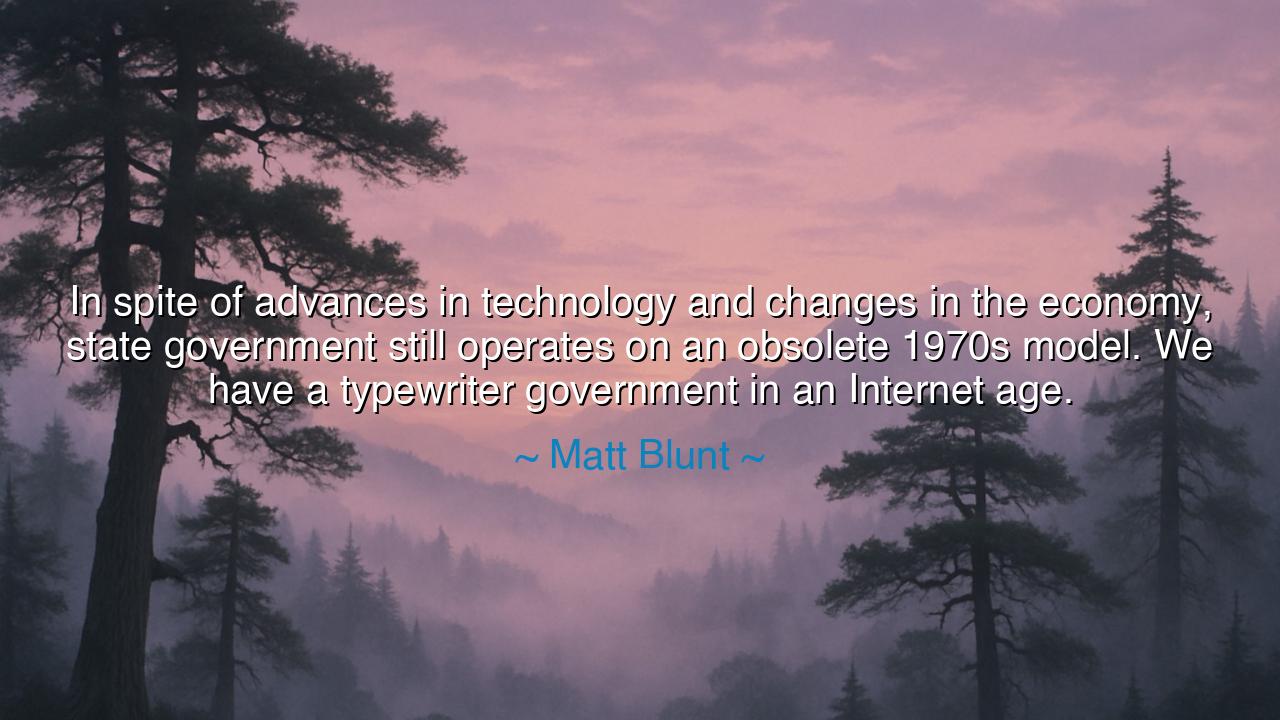
In spite of advances in technology and changes in the economy
In spite of advances in technology and changes in the economy, state government still operates on an obsolete 1970s model. We have a typewriter government in an Internet age.






Hear the words of Matt Blunt, who declared with sharpness and urgency: “In spite of advances in technology and changes in the economy, state government still operates on an obsolete 1970s model. We have a typewriter government in an Internet age.” His words are not merely political critique but a warning written in thunder. For he names the tragedy of institutions that cling to the past, unable to keep pace with the march of invention, unable to serve the people with the speed and clarity demanded by a new era.
When he speaks of technology and economy, Blunt points to the twin rivers that shape the destiny of nations. The tools of mankind and the flow of commerce change swiftly, reshaping the lives of citizens year by year. Yet while the people adapt to smartphones, satellites, and global networks, their governments often remain bound to old habits, slow and cumbersome, like scribes refusing to lay down their quills while the printing press roars. Thus, the machinery of the state grinds with inefficiency, unable to match the needs of the age.
The phrase typewriter government is a powerful image. The typewriter, once a marvel of efficiency, now stands as a relic, a symbol of slowness, limitation, and obsolescence. To call government a typewriter is to say that it still strikes one key at a time while the world has moved to infinite processing, instant connection, and vast communication. The Internet age is one of immediacy, where problems demand swift solutions, and citizens expect transparency and access. To remain in the typewriter era is to fail the people one claims to serve.
History offers us many such examples. Consider the fall of the Ottoman Empire, often called “the sick man of Europe.” While other nations modernized their armies, industry, and administration, the Ottomans clung to old methods and resisted reform. For centuries, this refusal to adapt eroded their strength until the empire collapsed in the early 20th century. Their fate illustrates Blunt’s warning: any government that clings too long to obsolete forms while the world races ahead will be left behind, weakened, and eventually swept away.
Yet Blunt’s words are not hopeless; they carry a call to renewal. To see government as a typewriter is not to curse it forever but to awaken it to change. Just as families, schools, and businesses embraced technology to survive, so too must the state learn to evolve. Innovation is not the enemy of governance; it is the instrument by which justice, service, and efficiency can be multiplied. The great challenge is not whether governments will change, but whether they will do so in time to meet the needs of the people they are sworn to protect.
The meaning of his quote extends beyond politics. It speaks to every human endeavor. To cling to old habits, outdated models, and obsolete ways of thinking is to carry the burden of a typewriter in a world of networks. Progress requires courage—the courage to let go of the past, to embrace the tools of the present, and to prepare for the future. Those who resist will be overtaken; those who adapt will endure.
Therefore, the lesson is clear: do not allow your own life, your work, or your institutions to remain as a typewriter in an Internet age. Seek always to learn, to grow, to adapt, and to embrace the tools that allow you to serve more fully and live more wisely. Just as the individual must update his thinking, so must the state refresh its systems. Renewal is not a luxury—it is the price of survival.
So, beloved listener, take this counsel: be vigilant against stagnation. Examine your life and your society, and ask where the typewriter still lingers, where old models choke the flow of new life. Then act, with courage and with vision, to bring change. For Blunt’s words are a reminder to every generation: adaptation is the breath of progress, and without it, even the strongest shall wither.






AAdministratorAdministrator
Welcome, honored guests. Please leave a comment, we will respond soon